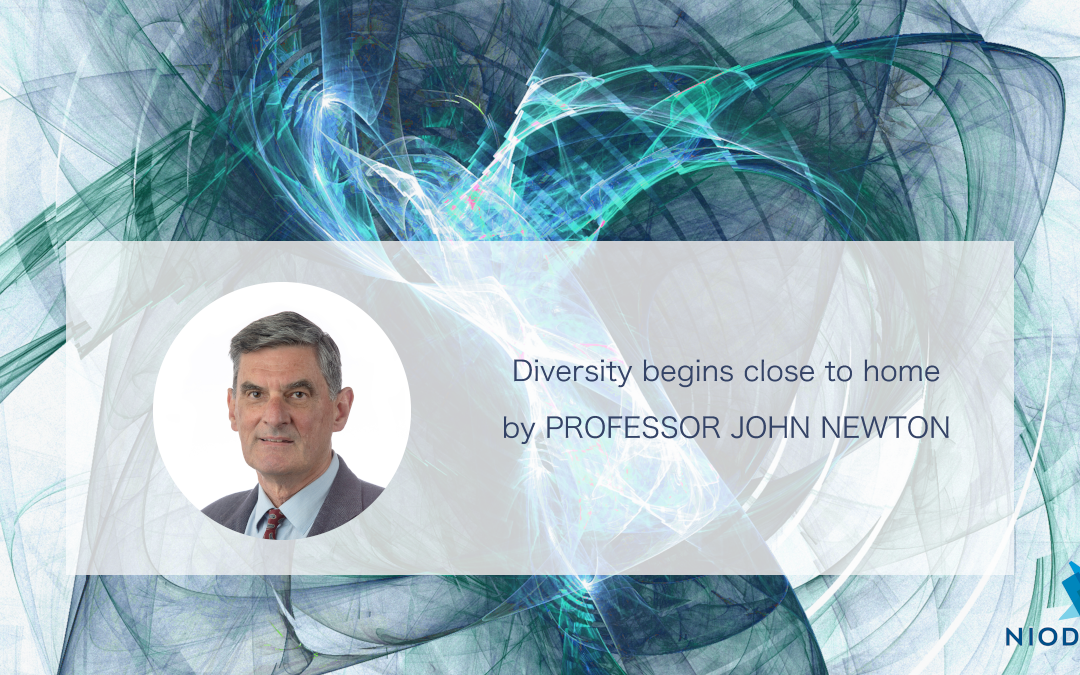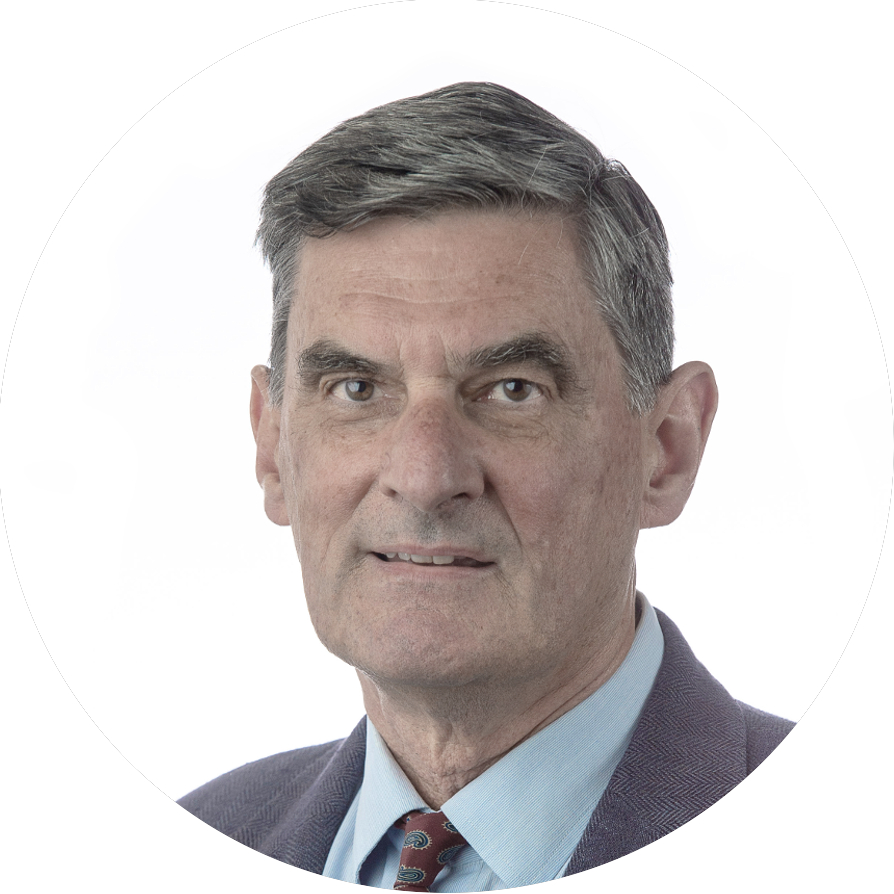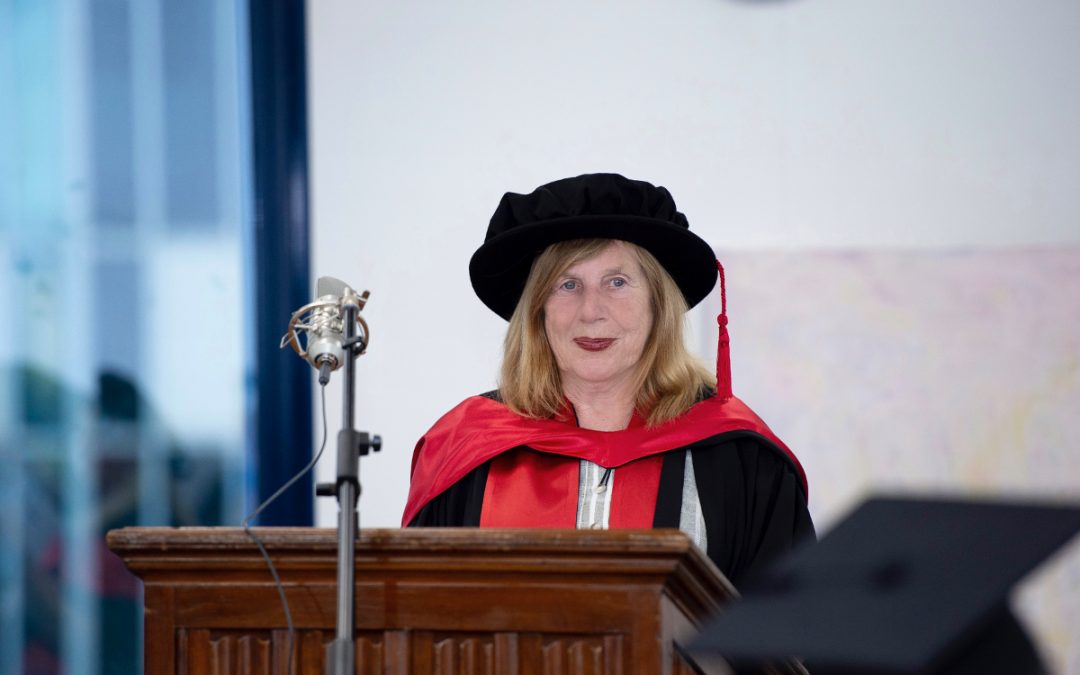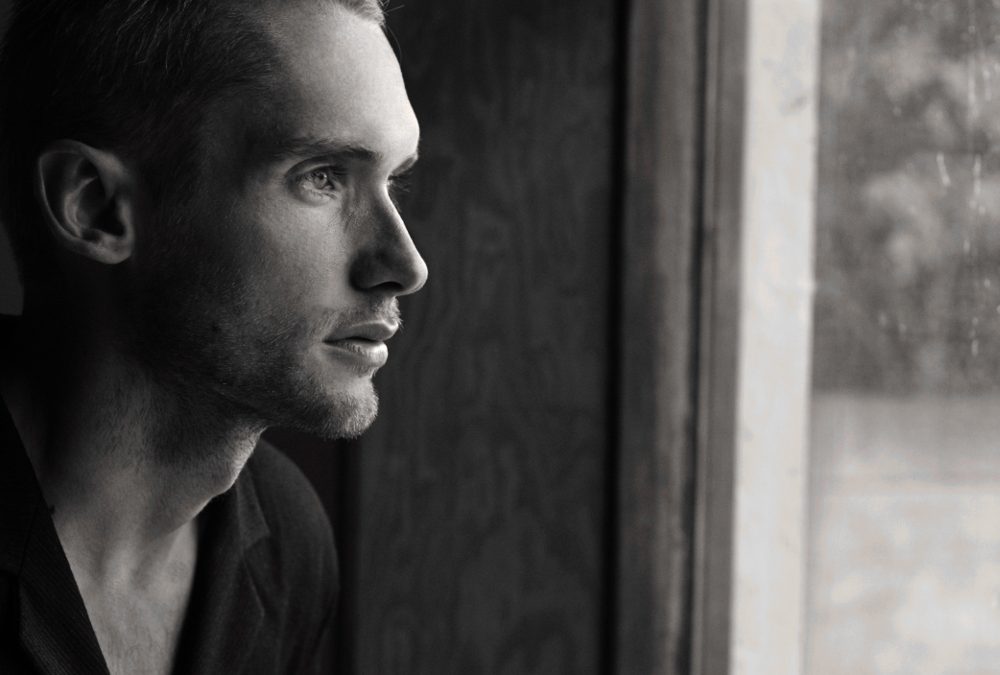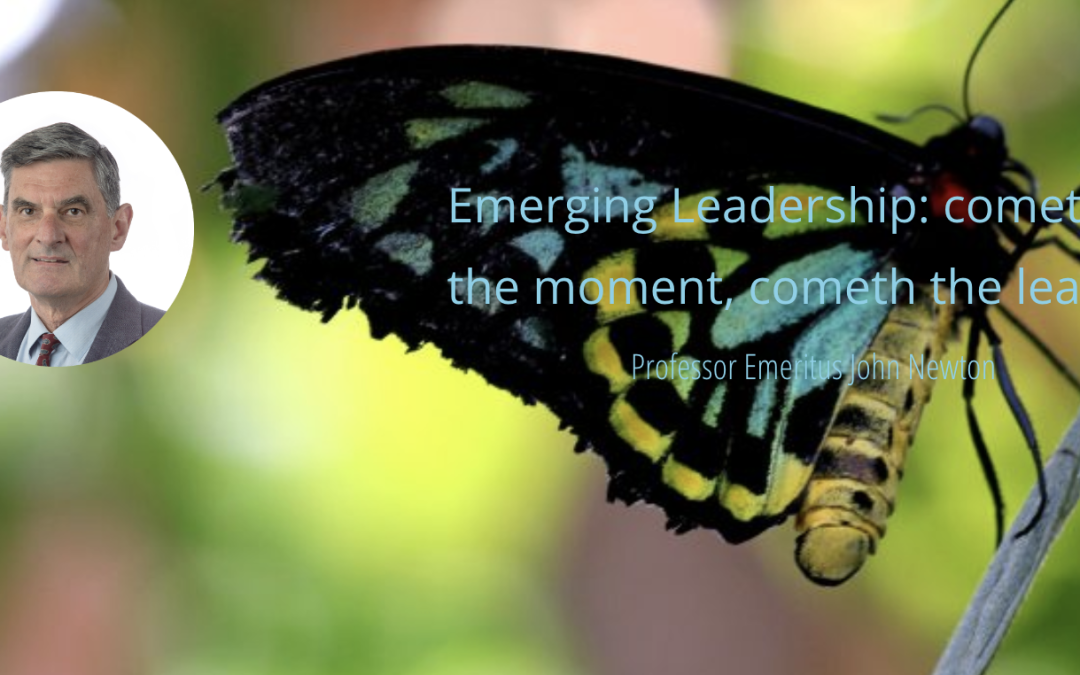
Emerging Leadership: Cometh the Moment, Cometh the Leader
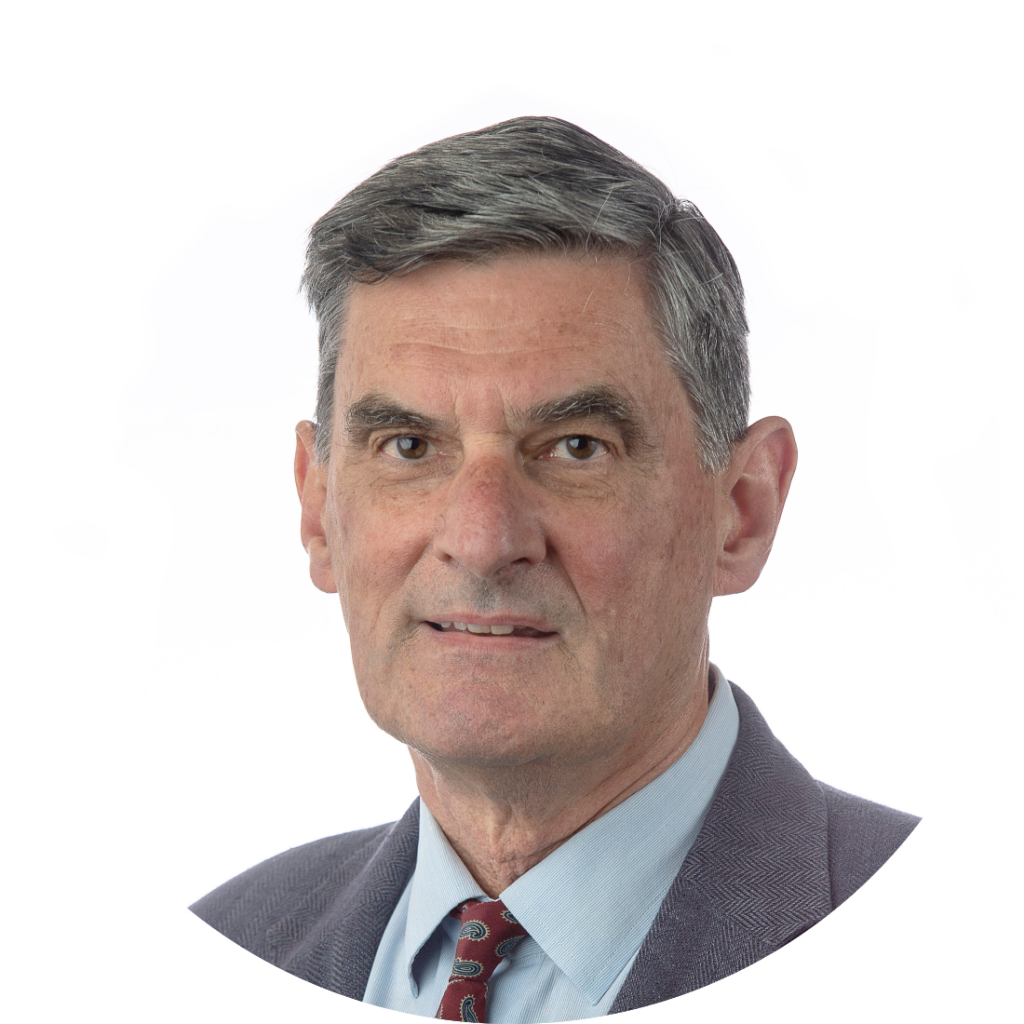
Emerging Leadership: cometh the moment, cometh the leader
Professor Emeritus John Newton
Emerging Leadership: cometh the moment, cometh the leader.
Popular literature and human dependence promote the idea of The Leader, someone who can be relied on to show us the way. As if The Leader is always a leader. Some individuals are able to manipulate this wish and convince others that they have some special quality which makes them a person to follow in all circumstances. However, the evidence of history is that successful leadership is always circumstantial, regardless of whether history judges the outcomes to be good or bad. Such circumstances are a combination of the social forces that originate outside the person and the unique capacities that emerge from within the person at the right time.
At this time in Australia, we have a pending referendum on an Indigenous Voice to Parliament. We have official ‘leaders’ seeking followership, The Prime Minister (Yes) and the Leader of the Opposition (No). Both the individuals occupying these roles are currently regarded as uninspiring, just playing politics, not really mobilising others to identify with the possibilities of change.
Formally they are regarded as ‘leaders’ but on this issue, they are just politicians. The historical moment, which neither of them can claim to have shaped, is searching for a person or group who/which can connect the historically determined circumstance to the lived experience of those who will decide Yes or No through their vote.
The vacuum of leadership on this issue is not surprising because neither formal ‘leader’ can point to any convincing personal appreciation of what is at stake. Nothing is emerging at the top level; it is all about fixed arguments, ‘righting historical wrongs’ versus ‘threats to the constitution that has served us so well’.
Navigating Ambiguity: The Essence of Emerging Leadership
The notion of ‘emerging leadership’ is that it is a dynamically contingent relationship between what capacity an individual or group can find within themselves and how this speaks to the challenges others experience about which path to follow. We don’t need a leader if the choice is clear; then we only need an administrator or manager who decides the way forward based on some established criterion; a way that is tried and true, efficient, technically feasible, politically correct, evidence-based etc.
The emergent leader actually embraces an ambivalent situation and can look inward to discern an aspect of their being that connects to the deliberation about possibilities; and on the basis of that reflection argues for this way rather than that way, regardless of the formal position they hold, whilst mindful of the values of those they seek to influence.
Emergent leadership can be an everyday occurrence, not necessarily one of national and historical importance.
Discovering Leadership Through Personal Experience
Some years ago, working as an organisational consultant, I was persuaded by an acquaintance to offer assistance to her sister’s small business. Having started a fashion design business from her parent’s garage, this young woman had, with the unpaid help of her husband, achieved enough sales to employ another sister with marketing expertise and then, following further business growth, was needing to hire the first employee from outside the family. She wanted help in conducting the selection process such that this critical decision would enhance her growing enterprise whilst not threatening its family values. She had never used a consultant before, was appropriately dubious about the cost, and asked me if I knew anything about small business. I replied in the negative since all my consulting had been with larger entities.
We negotiated a sliding scale contract that would limit her risk depending upon the value she determined I was providing. She was really trusting her sister’s recommendation that I would be worth the expenditure. And I was impressed by her practical common sense.
It took two meetings between the sisters and me before I emerged as a leader in this circumstance.
As I reflected on my experience with the two sisters, of what was being said and not said and how this made me feel, I suddenly could not believe that I had told the client and myself that I did not know much about small business. When my conscious mind relaxed enough, I recalled that I had actually grown up in a small business. My father and his brother had started a small business after WWII and run it for 40 years. My whole young life had been shaped by the vicissitudes of a small business but the ‘professional’, adult me had left that all behind. When I got back in touch with my early experience, including memories of all the financial precariousness that my parents had tried to shield us from, of interfamily dynamics, and the direct satisfaction that I saw my father gain from being valued by his customers, I was in a changed state of mind when talking to my small business client.
Navigating Complex Leadership Dynamics: Balancing Intuition and Expertise
I began listening and speaking from a different space. I became a quiet leader whose thoughts and suggestions were amplified by my intuitive understanding of the risks and excitements my client was trying to estimate and choose. She was a talented and ambitious designer, a start-up entrepreneur in a notoriously risky sector and she had young children. Whose needs would prevail? Could it be both/and?
When I undertook that assignment I was already a ‘senior’ in the world of leadership development but obviously still very humanly vulnerable to putting conscious ‘knowing’ ahead of ‘coming to know’ within a particular circumstance. The case revealed that my most relevant resources were in my lived experience rather than my formal knowledge. I had to ‘emerge’ as a leader in the particular circumstance so could I lead my client to articulate what she felt about bringing an outsider into her business; a business that was outgrowing the family.
My sudden remembering of a past I had ‘forgotten’ is what Freud meant by getting in touch with the unconscious. In the consultation I did not need to explore why I had repressed my early experience, it was enough to embrace the creative lead it gave me into the current circumstance. It gave me a voice that was missing up until that point. A voice that was sufficiently authentic for my client to take it seriously.
Cultivating Emerging Leadership: Unveiling Personal Experience for Future Possibilities
So I now argue that a critical aspect of leadership development is a process of helping individuals to recover the resources that exist within their own experience. This is different from developing an administrator, manager or executive who is rightly expected to have requisite knowledge and skills for the job they are employed to do. Leadership is not a fixed position. The need for leadership emerges and it can be offered by those who have some insight into future possibilities; possibilities that can connect the known to the unknown. We cannot be trained to do that but we can be primed to do it, if we learn to reflect in an intentional way to recall, to recognise and to harvest our past experiences as a resource for the future.*
Leadership does not belong to a formal role; it finds a voice of its own.
It is quite possible that neither the Prime Minister nor the Leader of the Opposition have the internal resources to inspire a future for the Indigenous Voice but that does not mean such leadership will not emerge. Leadership does not belong to a formal role; it finds a voice of its own.
*My colleagues at NIODA are offering a leadership development workshop to encourage just this, ‘Embracing your personal history for impactful leadership’. Learn more here.
Professor Emeritis John Newton
August 2023
Emerging Leadership: cometh the moment, cometh the leader

Professor Emeritis John Newton
John Newton is a freelance consultant to managers and organisations. After early career employment in the public and private sectors he entered academia, first at Swinburne University of Technology where he became the founding director of the Master in Organisation Behaviour in 1987, then as Associate Professor at RMIT University where he founded the Master in Organisation Dynamics in 2002. He is a member of ISPSO and GRA (President, 2011-12) and sits on the editorial boards of the journals Socioanalysis, and Organisational and Social Dynamics. John is a past NIODA Board of Governance Chair and is now the Chair of NIODA’s Board of Governance (Learning Activities)
About NIODA
The National Institute of Organisation Dynamics Australia (NIODA) offers internationally renowned post-graduate education and research in organisation dynamics, and decades of experience consulting with Australian organisations.
The study of organisation dynamics brings together socio-technical and psychoanalytic disciplines to explore the unconscious dynamics that exist in every group, team or organisation. Learning more about these theories, and reflecting on the experience of them, can support leaders and managers to unlock great potential in their organisations, tackling issues through a whole new light.
PO Box 287, Collins Street West,
Wurundjeri Melbourne 8007 Australia
+61 (0) 414 529 867
info@nioda.org.au
NIODA acknowledges the Kulin Nations, and respective Traditional Custodians of the lands we work on.
We pay our respects to Elders past and present, and recognise their enduring sovereignty which has, and continues to, care for Country.
NIODA welcomes the Uluru Statement from the Heart’s invitation to walk with Aboriginal and Torres Strait Islander peoples in a collective movement for a better future.

